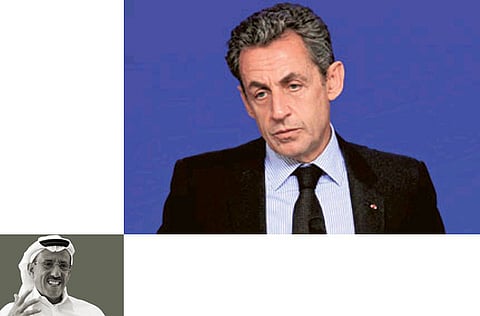Sarkozy has done France proud
His courageous decision-making on Libya and Syria has pushed Paris to the global political forefront

On April 22, France's voting public will go to the polls to decide whether to keep President Nicolas Sarkozy in the Elysee Palace. Like most non-French, in the early days of his presidency I was sceptical about his qualities as a statesman.
Then dubbed Monsieur Bling-Bling for his flamboyant style, I suspected he might fail to keep his promise to restore his country to the status of a great nation. The surprising thing is he's done it. My hope is that French voters will tick his name on their ballot papers.
Sarkozy has evolved into a great statesman in the mould of president Charles de Gaulle who, as the first post-Second World War president, sought to elevate his country's profile. Since his resignation on April 26, 1969, France's geopolitical influence has waned.
Then along came Sarkozy who's grown into the job year-upon-year. His courageous decision-making has pushed Paris to the global political forefront on par with Washington and London with which he has worked to cement close relations. That wasn't an easy task when France's stance against the 2003 invasion of Iraq resulted in all things French being ridiculed in the US.
In recent times, the French leader has taken the lead on sensitive issues around the world. France is no more a watcher. Today, there are streets named after him throughout Libya as it is largely thanks to Sarkozy's passion that Nato launched a military intervention.
France's president is just as forthright over the Al Assad regime's brutality. He's closed France's embassy in Damascus over Syrian President Bashar Al Assad's ‘scandalous' repression and warned Syrian officials that they will "be called to account for their crimes before international jurisdictions."
He is in solidarity with the Syrian opposition and showed his respect for two French journalists evacuated from the besieged city of Homs by greeting them at the airport. They and their media fellows have suffered a terrible ordeal to get out the truth.
Horrors of Homs
The Sunday Times photographer Paul Conroy, injured during the same attack that took the life of war reporter Marie Colvin, painted a chilling picture of the stricken Baba Amr district. "It's not a war, it's a massacre," he told Sky News. "Once again the world sits by and watches."
He explained that entire streets have been wiped out by regime forces along with their residents. He says the regime is systematically eradicating anyone who stands in its way including women, children and old men. He compares the killing in Homs to the Srebrenica massacre. Homs is a city of "rooms full of people waiting to die," he told the Daily Telegraph. He recounts how someone brought him half a baby, asking "Where's the help?" and his pain at not being able to come up with an answer.
I am sure that Sarkozy learnt of those horrors from the French reporters. I pray that he's motivated to immediately arm the opposition and reinforce a no-fly zone. Whether out of humanitarian concerns or national interest, he rescued the citizens of oil-rich Libya and there's no doubt that France would increase its clout in this US-dominated region by helping to oust the Al Assad regime.
Sarkozy has also proved to be a staunch advocate of a Palestinian state, unafraid to use harsh words against Israel's expansion of Jewish colonies and the theft of Arab land.
Last September, he proposed a one-year timetable for the establishment of a Palestinian state and, more recently, has implied that France would recognise a unilaterally declared Palestinian state. He boldly criticised the US for its veto on Palestine's UN membership — and voted for Unesco's recognition of a Palestinian state against Washington's objections.
There are, of course, those who believe Sarkozy has presided over anti-Islamic policies such as the headscarf and burqa bans. However, his far-right rival the National Front's Marine Le Pen is attacking him for being too soft on France's Muslim communities.
Le Pen, whose father is a notorious anti-Semite, has likened Muslims praying outdoors to the Nazi occupation, which Sarkozy condemned. She is currently trailing behind the Socialist Party's Francois Hollande and Sarkozy in polls but given that some people are embarrassed to admit any affiliation with a known-racist party to pollsters, she could be a threat.
Sarkozy's not perfect but he possesses oratorical skills, charisma and the courage of his convictions. He is fair-minded and has struck a balance between Arab and Israeli interests. Outside France, not much is known about Hollande's foreign policy but one indication comes from a group of French Jewish organisations, the CRIF that has praised Hollande's commitment to his Jewish faith and Israel.
However, foreign affairs are never the biggest vote-getters. Unfortunately for Sarkozy, like other leaders, he has had to steer his country through a global downturn. Sarkozy says he saved France from economic catastrophe but with France having lost its triple-A credit rating and burdened with massive fiscal debt will voters believe him?
Certainly, Sarkozy is a better bet than the untried and unknown Hollande, dubbed "Mr Normal" and a great improvement on Le Pen whose campaign is based on whipping up anti-Muslim sentiment. All that's left for me to say is to wish him a hearty Bonne Chance !
Khalaf Al Habtoor is a businessman and chairman of Al Habtoor Group.



